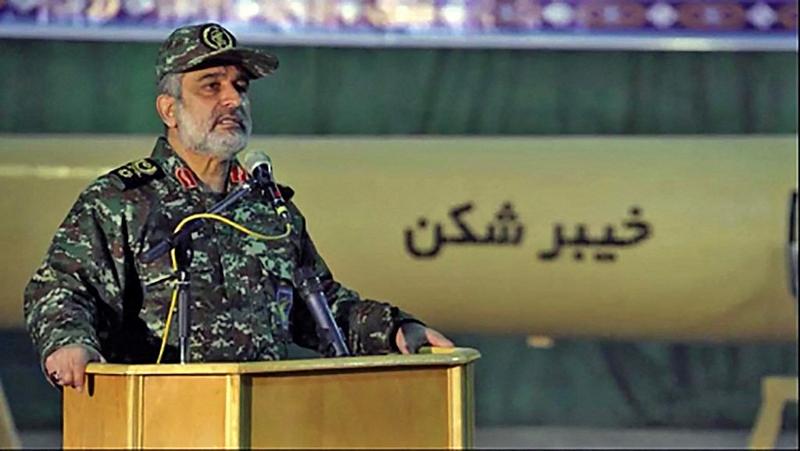 A handout photo made available on February 9, 2022 by the official website of the Iranian Revolutionary Guard Corps (IRGC) Sepahnews shows Iranian commander of the IRGC's Aerospace Force, Amir Ali Hajizadeh, speaking at the podium in front of the surface-to-surface missile Khaybarshekan at an undisclosed location in Iran. (SEPAHNEWS / AFP)
A handout photo made available on February 9, 2022 by the official website of the Iranian Revolutionary Guard Corps (IRGC) Sepahnews shows Iranian commander of the IRGC's Aerospace Force, Amir Ali Hajizadeh, speaking at the podium in front of the surface-to-surface missile Khaybarshekan at an undisclosed location in Iran. (SEPAHNEWS / AFP)
DUBAI - Iran has developed a cruise missile with a range of 1,650 km (1,025 miles) a top Revolutionary Guards commander said on Friday, in a move likely to raise Western concerns.
Separately, Amirali Hajizadeh, the head of the Revolutionary Guards aerospace force, also spoke of Iran's often repeated threat to avenge the US killing of a top Iranian commander, saying "We are looking to kill (former US President Donald) Trump."
Iran has expanded its missile program, particularly its ballistic missiles, in defiance of opposition from the United States and expressions of concern by European countries
"Our cruise missile with a range of 1,650 km has been added to the missile arsenal of the Islamic Republic of Iran," Hajizadeh, told state TV.
The television broadcast what it said was the first footage showing the new Paveh cruise missile.
ALSO READ: Iran slaps 'retaliatory' sanctions on EU, UK individuals, entities
Hajizadeh said Iran did not intend to kill "poor soldiers" when it launched a ballistic missile attack on US-led forces in Iraq days after Iranian military commander Qassem Soleimani was killed in a US drone strike in 2020 in Baghdad.
"God willing, we are looking to kill Trump. (Former Secretary of State Mike) Pompeo ... and military commanders who issued the order (to kill Soleimani) should be killed," Hajizadeh said in the television interview.
Iranian leaders have often vowed to avenge Soleimani in strong terms.
Iran has expanded its missile program, particularly its ballistic missiles, in defiance of opposition from the United States and expressions of concern by European countries. Teheran says the program is purely defensive and of a deterrent nature.
READ MORE: Iran says cooperation with IAEA remains 'important principle'
In November, the Pentagon said the United States was sceptical of reports quoting Hajizadeh as saying Iran had developed a hypersonic ballistic missile.


